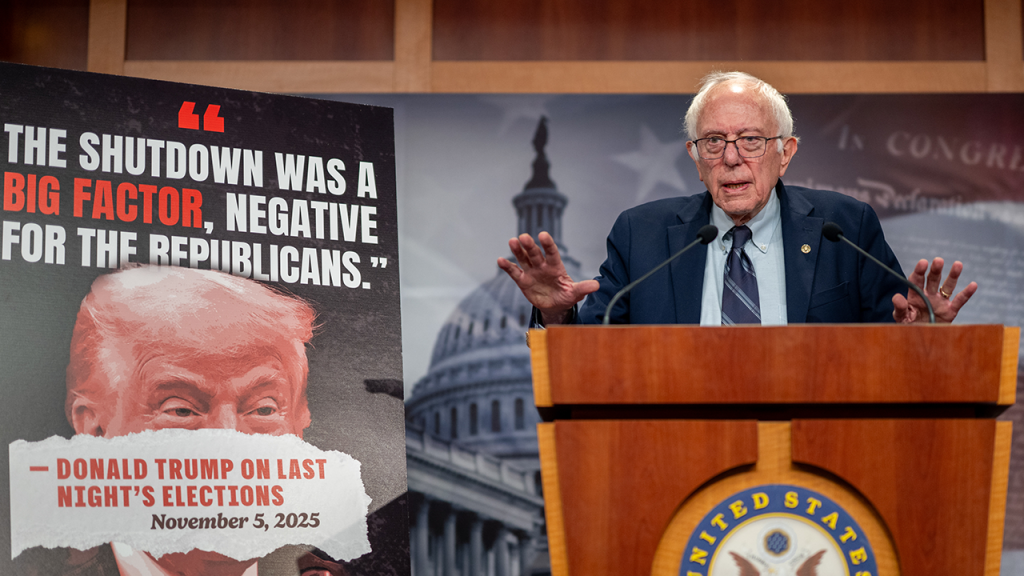Listen to the article
Independent Senator Bernie Sanders has sharply criticized eight Senate Democrats who voted with Republicans to advance a continuing resolution aimed at preventing a government shutdown, calling it “a very, very bad vote” that undermines healthcare protections for millions of Americans.
In a video posted to his X account following Sunday’s procedural vote, Sanders expressed deep concern about the resolution’s potential impact on healthcare accessibility and affordability across the country.
“Tonight, 8 Democrats voted with the Republicans to allow them to go forward on this continuing resolution,” Sanders said. “And to my mind, this was a very, very bad vote.”
According to the Vermont senator, the measure threatens to dramatically increase healthcare costs for over 20 million Americans. “It raises healthcare premiums for over 20 million Americans by doubling, and in some cases tripling or quadrupling them,” he warned. “People can’t afford that when we are already paying the highest prices in the world for healthcare.”
Sanders further cautioned that the resolution “paves the way for 15 million people to be thrown off of Medicaid,” citing studies indicating this could result in approximately 50,000 unnecessary American deaths annually. He contended these healthcare cuts were being made to finance “a trillion dollars in tax breaks to the 1%.”
The senator framed the vote within the broader context of the recent national elections, suggesting it contradicted voters’ wishes. “What the election showed is that the American people wanted us to stand up to Trumpism — to his war against working-class people, to his authoritarianism. That is what the American people wanted. But tonight, that is not what happened.”
The nonpartisan Congressional Budget Office (CBO) has substantiated some of Sanders’ concerns. CBO analysis indicates that allowing the enhanced Affordable Care Act subsidies implemented under the American Rescue Plan to expire would significantly increase out-of-pocket costs for millions enrolled in ACA marketplaces.
Healthcare experts have reinforced these warnings. Studies cited by the Senate Committee on Health, Education, Labor, and Pensions (HELP), which Sanders chairs, estimate that substantial cuts to Medicaid could indeed lead to tens of thousands of preventable deaths annually.
A 2023 HELP Committee report referenced peer-reviewed research published in respected medical journals showing a strong correlation between loss of Medicaid coverage and increased mortality rates due to reduced access to both preventive and emergency care.
These concerns were further validated by a June 2025 letter from researchers at the Yale School of Public Health and the University of Pennsylvania’s Leonard Davis Institute of Health Economics, which projected that proposed federal healthcare cuts “could lead to over 51,000 preventable deaths annually.”
Sanders’ criticism of the resolution reflects his long-standing advocacy for universal healthcare and opposition to Republican budget proposals that he believes prioritize tax benefits for wealthy Americans at the expense of working-class citizens.
“We’ve got to go forward, do the best that we can to ensure and protect working-class people, to make sure that the United States not only does not throw people off of healthcare, but ends the absurdity of being the only major country on earth that doesn’t guarantee healthcare to all people,” Sanders concluded. “We have a lot of work to do, but to be honest with you, tonight was not a good night.”
The continuing resolution debate highlights the ongoing partisan divide over healthcare funding and access in America, with significant implications for millions of Americans who depend on affordable healthcare coverage.
Fact Checker
Verify the accuracy of this article using The Disinformation Commission analysis and real-time sources.




6 Comments
As someone concerned about the state of the US healthcare system, I’m glad Senator Sanders is raising these issues. However, I think it’s important to look at the full context and details of the funding bill before drawing firm conclusions. Maintaining government services is also crucial during these times.
While I respect Senator Sanders’ passion for healthcare reform, I’m not sure this funding bill is the right vehicle for those debates. Preventing a government shutdown seems like the more urgent priority at the moment. But I agree the healthcare implications need close examination.
This vote highlights the ongoing partisan divides in Congress on healthcare policy. While the goal of preventing a government shutdown is important, the potential tradeoffs around healthcare seem concerning. I hope the Senate can find a compromise that protects essential services and coverage for Americans.
This is a concerning development for those of us who believe universal healthcare should be a top priority. Senator Sanders is right to sound the alarm on the potential consequences of this bill. I hope the Senate can work toward a more comprehensive solution that protects Americans’ wellbeing.
Senator Sanders makes some valid points about the risks of this funding bill for millions of Americans’ healthcare. As a country, we need to find ways to improve affordability and access to quality healthcare. Hopefully this debate leads to constructive discussions, rather than more partisan gridlock.
Interesting perspective from Sen. Sanders on the potential impacts of this funding bill on healthcare access and affordability. As a supporter of universal healthcare, his concerns about rising premiums and Medicaid cuts are understandable. It will be important to closely examine the details of the bill and its implications for the public.